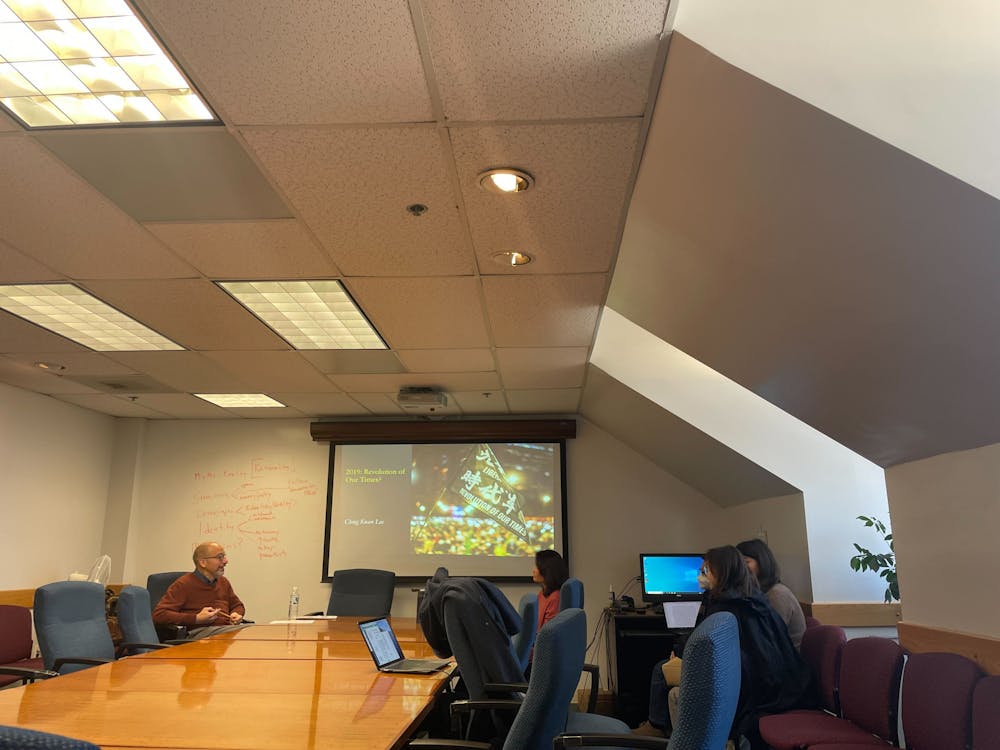Ching Kwan Lee kicked off this semester’s East Asian Studies Speaker Series with her talk, “Was Hong Kong 2019 a ‘Revolution of Our Times’?” on Feb. 23. The event was co-sponsored by the Department of Sociology and International Studies and was the first of five events featuring prominent scholars across the fields of sociology, political science, international studies and anthropology.
Lee is a professor of Sociology at the University of California, Los Angeles. She has studied labor politics and the Chinese economy extensively and has recently shifted her research focus to Hong Kong, her hometown.
Lee grew up in colonial Hong Kong and also experienced the 2019 protests first-hand. She recently published a short format book titled Hong Kong: Global China's Restive Frontier. She is currently working on a monograph titled Forever Hong Kong: A Global City’s Struggle for Decolonization.
The talk began with an overview of Hong Kong’s history from 1842 to the present. Lee broke down the timeline into three periods: 1842–1997, when Hong Kong was a British colony and capitalist heaven, 1997–2019, the interregnum years, and from 2019 onwards when the anti-China protests began.
Lee identified four pillars of colonial hegemony: stability and prosperity, the rule of law, the free market and the idea that China is destiny — all four pillars were completely dismantled in a short span of 20 years.
“These four pillars set the limits of the political sphere, you can never go beyond them because they are held up as sacred principles,” she said. “Everyone wants prosperity and stability... Hong Kong is a textbook case of free market as a result of British colonialism, and we can never fight Communist China. China is inevitable and invincible. We were taught that way.”
By 2019, the social and political landscape of Hong Kong had changed drastically, as Hong Kong residents engaged in burnism, promoted violence, supported the yellow economy and identified China as the enemy. In her talk, Lee set out to fill the gap in the timeline by answering the question of how Hong Kong got to the period lasting from 1997 to 2019.
Joel Andreas, professor of Sociology and director of the East Asian Studies Program, introduced Lee. In an interview with The News-Letter, Andreas shared his appreciation for Lee’s detailed explanation of the changes in Hong Kong.
“Her description of that hegemonic ideology under the British colonial system that she grew up under and then her pointing out that that had radically changed was very sharp,” he said. “Hong Kong went from being one of the most apolitical places in the world to being one of the most politicized places in the world. That’s quite a remarkable change, and she explained what caused this.”
In an interview with The News-Letter, sophomore Mary Lee, expressed a similar sentiment, sharing how she benefited from the contextual information Lee provided.
“Listening to the history behind the entire 255 years of colonialism and what happened in between — that question is something I didn’t think about,” she said. “It’s really cool to hear her going back to the root of it all.”
Lee emphasized that Hong Kong is a unique situation, both in terms of its history and its current predicament. From 1842 to 1997, Hong Kong experienced what she described as a double coloniality, with British rule in the front and China in the back as the phantom colonizer.
Today, Hong Kong is again fighting a battle on two fronts, facing both the threat of global neoliberalism and Communist China’s dominating presence head-on, something no other nation has experienced.
“Hong Kong is a paradigmatic case, an extreme case, of how as a society, as a community, you can mobilize popular resistance facing these two ethical challenges,” Lee said. “In other places, you only deal with one, but in Hong Kong, it is two.”
During the question and answer section, attendees raised questions about the future of the movement and whether the ideals would persist through governmental repression. Lee responded with a positive answer.
“It is about how people make connections and sustain this deterritorialized sense of belonging,“ she said. “This decolonization struggle that they have gone through together, that historical experience, is what will tie people together.”
In an interview with The News-Letter, senior Chenzhuo Li described how Lee’s argument differs from his own perspective.
“She said that the resistance still exists after the government tried to repress it. That’s a new argument for me,” Li said. “What I have heard is that the foundation of the movement is gone, and the environment is gone. A recent survey that I read showed that the belief in Hong Kong identity has actually decreased.”
Lee expressed that the spirit of Hong Kong lives on and will be redeveloped elsewhere.
“Hong Kong to me is dead,“ she said. “My birth city is no more, but because it’s dead, it’s forever.”





